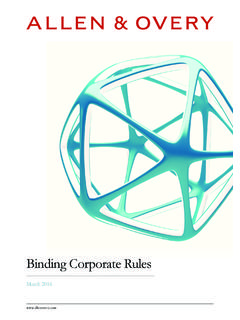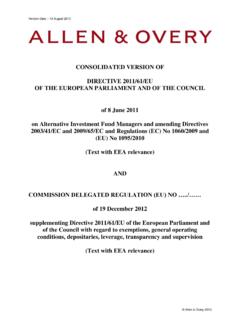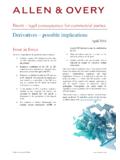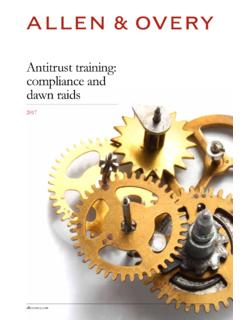Transcription of A guide to public takeovers in Germany - Allen & Overy
1 A guide to public takeovers in guide to public takeovers in Germany | 20172 Allen & Overy LLP 2017 Strong in public takeovers . JUVE 2014/2015 has one of the leading takeover practices JUVE 2013/2014 Highly recommended firm for M&A, whose well-rounded full-service offer means it is ideally positioned to advise on complex high-volume M&A deals. JUVE 2013 4 Pre-bid issues 5 Announcement obligations 5 Due diligence 5 Offer-related arrangements 5 Confidentiality and standstills 6 Shareholder (irrevocable) undertakings 6 Dealings in target shares 7 Scope and restrictions 7 Other consequences 7 Disclosure thresholds 7 Structuring German takeovers 9 Takeover offers 9 Financing and certain funds 11 Key percentage thresholds 11 Conditions 13 Announcing and making the offer 14 How does the offer process usually start?
2 14 Can a requirement to announce be triggered by an approach by a bidder? 14 Put up or shut up 15 Conduct during a bid 16 Must target board seek independent advice? 16 Best price principle 16 Can the offer price be increased? 16 Are there restrictions on the making of competing offers? 16 Timetable matters 18 Acceptance period 19 Documentation for shareholders 20 Offer documentation 20 Are there any restrictions on the supply of information during the offer period? 20 Dealing with the minority 21 Introduction 21 The squeeze-out procedure 21 Alternative squeeze-out mechanisms 22 De-listing requirements 22 Defending a hostile bid 23 What defensive measures are available?
3 23 Mandatory offers 24 When is it required to make a mandatory offer? 24 Acting in concert 24 Are there exemptions to the mandatory offer rules? 24 Regulatory overview 26 Legal framework 26 How are the legislation and rules enforced? 26 What are the thresholds for notification under merger control legislation? 26 European merger control rules 28 Does Germany have foreign exchange restrictions? 29A guide to public takeovers in Germany | 20174 Allen & Overy LLP 2017 The takeover of a listed company can be effected by virtue of a public offer addressed to the shareholders of such listed company for the acquisition of their shares in exchange for cash, securities, or a combination of the German public offer rules apply when the target company of such offer is a German listed company whose shares are admitted to trading on a German stock exchange or another regulated market in the European Economic Area.
4 The German rules may also apply if the target is a foreign company whose shares are admitted to trading on a German stock exchange. If the target is listed both in Germany and in another jurisdiction (inside or outside the European Economic Area), additional foreign regulations may apply. This brochure is limited to a discussion of the law regarding public bids for companies listed only in guide provides a high level overview of the legal framework regarding public takeover bids in issuesAnnouncement obligationsThe German rules lay down strict requirements for when an announcement must be made.
5 Therefore it is very important for the potential bidder and the potential target to maintain the utmost secrecy prior to the announcement of an offer, so as to avoid a forced premature announcement before the preparations have been completed. Furthermore, as the pricing rules for takeover and mandatory bids are tied to the stock exchange price of the target shares and as information about the upcoming bid will be likely to result in an increase of the stock exchange price, it is in the interest of the bidder to avoid any DiligenceRecommended offerThe management board of the target company is the gatekeeper for due diligence based on the books and records of the target company.
6 The management board of the target may permit a bidder to conduct due diligence if and to the extent this is in the best interest of the target company. A confidentiality undertaking of the bidder is a must have condition for this exercise. Apart from that, it is up to the management board of the target, based on a letter of intent or an indicative offer submitted by the bidder, to assess the interest of the target company in the proposed transaction, the consideration to be offered by the bidder and the chances of success of the offer. If the bidder is permitted to conduct due diligence based on the books and records of the target company, the bidder will usually be given only limited information during a limited period of offerIf the offer is hostile, the bidder is usually confined to base its bid on public information.
7 This is the case even if the hostile offer is competing with a recommended offer of another bidder. There is no rule under German law under which a competing bidder would be entitled to receive the same level of information as the previous informationInformation which can be retrieved from the website, the commercial register of the target company or other public sources usually comprises the following items: the annual accounts; the articles of association; major shareholders (disclosure of substantial shareholding starts at 3% of the voting rights); members of the management board and the supervisory board.
8 Issued share capital, the delegation of powers to the management board to issue new shares; minutes of shareholder meetings including shareholder resolutions; and a description of the corporate governance and any takeover protections arrangementsCan the target grant exclusivity?Yes in principle, but the management board of the target company must act in the best interest of the company. Entering into an exclusivity agreement may not be in the interest of the target if this prevents the target from considering alternative transactions. Therefore, depending on the specific circumstances, granting exclusivity may not be a proper discharge of the target directors duties.
9 This is the reason why target companies will usually seek to agree on a fiduciary out in the event of a superior offer. These kinds of arrangement are usually part of a business combination agreement or investment agreement entered into between the bidder and the target. A guide to public takeovers in Germany | 20176 Allen & Overy LLP 2017 Confidentiality and standstillsIs a confidentiality agreement enforceable?A target will require a potential bidder to enter into a confidentiality agreement or non-disclosure agreement before it is willing to hand over any non- public information.
10 If the target also wishes to conduct due diligence on the bidder, the bidder will want a reciprocal agreement. It is quite common to include standstill provisions in confidentiality agreements of this nature. The target may be required to disclose the preparation of an offer if the offer preparations have progressed so far that they constitute inside information. A premature disclosure is usually in the interest of neither the target nor the bidder. To prevent premature disclosure, the target may decide to delay disclosure, which is permissible if (i) delaying disclosure is in the interest of the target, (ii) the target can ensure confidentiality and (iii) the non-disclosure will not mislead the market.












